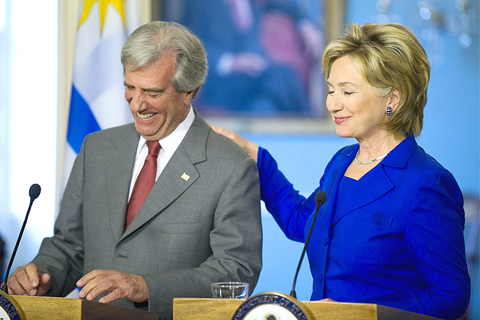US Secretary of State Hillary Clinton on Tuesday urged Venezuela to be transparent over its arms purchases as she and Uruguayan President Tabare Vazquez expressed worry about a regional arms race.
“We have expressed concern about the number of Venezuelan arms purchases,” Clinton told reporters during a joint press conference with Vazquez.
Venezuela’s arms purchases “outpace all other countries in South America, and certainly raise the question as to whether there is going to be an arms race in the region,” the chief US diplomat said.

PHOTO: EPA
“So we urge Venezuela to be transparent in its purchases, clear about its purposes,” Clinton said.
She urged Caracas to set up a system “to ensure that the weapons they buy are not diverted” to insurgent groups or criminal cartels such as drug gangs.
The US is especially worried about Venezuela’s new deal with Moscow to purchase battle tanks, multiple-launch rocket systems, and vehicle-mounted surface-to-air missile systems targeting incoming missiles.
The fledgling Union of South American Nations (Unasur), which includes Uruguay, held a meeting in Ecuador on Tuesday that was called over fears sparked by an agreement allowing the US military access to Colombian bases.
At Colombia’s insistence, the meeting has also been broadened to include discussion of Venezuela’s arms purchases from Russia, and Brazil’s decision to buy French submarines and aircraft.
Vazquez expressed broad concerns without singling out any particular deal.
“With respect to the arms race, not only is our country worried, but we have already expressed time and again our position against an arms race,” Vazquez told reporters.
He said Uruguay opposes an arms race because it diverts resources in a region with a poor distribution of wealth — resources that could be better spent on health, education and housing.
“But it’s a fact, and we can’t deny it, that the countries are buying weapons,” he said.
“South America has millions of people living in poverty, and there are thousands of children that die across Latin America and South America because of child diarrhea or diseases that could be prevented,” he said.
“We should devote our energies and resources to fight against the real scourges of our societies ... such as drug trafficking and terrorism,” he said.
In Caracas, Venezuelan President Hugo Chavez, a fierce US critic, said on Sunday that his country had obtained a US$2.2 billion credit from Russia for arms purchases.
Chavez said Venezuela is buying 92 Soviet-era T-72 main battle tanks, 300mm Smerch multiple-launch rocket systems and vehicle-mounted Russian Antey 2500 surface-to-air missile systems targeting incoming missiles.

Kehinde Sanni spends his days smoothing out dents and repainting scratched bumpers in a modest autobody shop in Lagos. He has never left Nigeria, yet he speaks glowingly of Burkina Faso military leader Ibrahim Traore. “Nigeria needs someone like Ibrahim Traore of Burkina Faso. He is doing well for his country,” Sanni said. His admiration is shaped by a steady stream of viral videos, memes and social media posts — many misleading or outright false — portraying Traore as a fearless reformer who defied Western powers and reclaimed his country’s dignity. The Burkinabe strongman swept into power following a coup in September 2022

‘FRAGMENTING’: British politics have for a long time been dominated by the Labor Party and the Tories, but polls suggest that Reform now poses a significant challenge Hard-right upstarts Reform UK snatched a parliamentary seat from British Prime Minister Keir Starmer’s Labor Party yesterday in local elections that dealt a blow to the UK’s two establishment parties. Reform, led by anti-immigrant firebrand Nigel Farage, won the by-election in Runcorn and Helsby in northwest England by just six votes, as it picked up gains in other localities, including one mayoralty. The group’s strong showing continues momentum it built up at last year’s general election and appears to confirm a trend that the UK is entering an era of multi-party politics. “For the movement, for the party it’s a very, very big

ENTERTAINMENT: Rio officials have a history of organizing massive concerts on Copacabana Beach, with Madonna’s show drawing about 1.6 million fans last year Lady Gaga on Saturday night gave a free concert in front of 2 million fans who poured onto Copacabana Beach in Rio de Janeiro for the biggest show of her career. “Tonight, we’re making history... Thank you for making history with me,” Lady Gaga told a screaming crowd. The Mother Monster, as she is known, started the show at about 10:10pm local time with her 2011 song Bloody Mary. Cries of joy rose from the tightly packed fans who sang and danced shoulder-to-shoulder on the vast stretch of sand. Concert organizers said 2.1 million people attended the show. Lady Gaga

SUPPORT: The Australian prime minister promised to back Kyiv against Russia’s invasion, saying: ‘That’s my government’s position. It was yesterday. It still is’ Left-leaning Australian Prime Minister Anthony Albanese yesterday basked in his landslide election win, promising a “disciplined, orderly” government to confront cost-of-living pain and tariff turmoil. People clapped as the 62-year-old and his fiancee, Jodie Haydon, who visited his old inner Sydney haunt, Cafe Italia, surrounded by a crowd of jostling photographers and journalists. Albanese’s Labor Party is on course to win at least 83 seats in the 150-member parliament, partial results showed. Opposition leader Peter Dutton’s conservative Liberal-National coalition had just 38 seats, and other parties 12. Another 17 seats were still in doubt. “We will be a disciplined, orderly